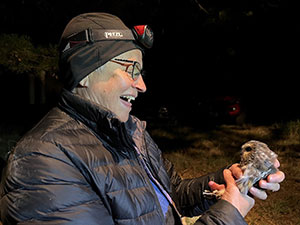
The University of Wyoming Biodiversity Institute and its partners recently honored those who participated in the Wyoming Naturalist Program (WNP). The group held its second annual meeting Sept. 24 in Casper to celebrate its members' accomplishments over the past year.
The WNP's mission is to cultivate a community of volunteers to steward the state's natural resources through conservation education and service. The program provides education and training to participants in biodiversity, ecology, conservation, management and interpretation, with a goal to create leaders in the effort to protect natural resources and the places where people in Wyoming live.
"The night prior to the annual meeting, WNP participants gathered on Casper Mountain to help catch and band northern saw-whet owls as part of an ongoing Audubon Rockies project," says Mason Lee, senior project coordinator of the Biodiversity Institute. "On Saturday morning (Sept. 24), WNP participants learned about habitat restoration efforts along the Platte River; heard from Andrea Orabona, a Wyoming Game and Fish Department nongame biologist, about the department's burrowing owl migration research; and recognized the Wyoming Naturalists' service and training."
Since the first cohort of students in spring 2021, 40 people have completed the initial training of the WNP and contributed approximately 1,250 hours of service to conservation projects throughout Wyoming.
Projects have included teaching ecology lessons at summer camps in Dubois; helping monitor populations of the critically imperiled Wyoming toad in Laramie; banding birds near Moorcroft; monitoring tent caterpillars' impacts on mountain mahogany plants in the Bighorn Mountains; partnering with a local school to build better mountain bluebird nest boxes at Guernsey State Park; and surveying for small mammals outside of Natural Trap Cave to assist researchers in their studies.
WNP participants also are encouraged to submit their plant and animal observations to iNaturalist, which contributes to global databases for research use. To date, WNP participants have uploaded over 1,000 observations of almost 600 species in Wyoming.
The WNP is coordinated by a committee of state agencies and nonprofits that includes UW's Biodiversity Institute, Audubon Rockies, UW Extension, Wyoming State Parks and the Wyoming Game and Fish Department.
To achieve certification, WNP participants must complete a basic training course virtually in early spring, culminating in a field session at the end of May. Additionally, participants must contribute 40 hours of volunteer service to conservation in Wyoming. To maintain certification, WNP participants must obtain eight hours of advanced training each year in addition to their annual 40 hours of volunteer service.
The WNP will open applications for its third cohort (2023 class) Tuesday, Oct. 11. Class size is limited to 25 people. To be notified of the application opening, interested individuals can sign up on the program's website at www.wyomingnaturalists.org.






